
18 Nov 2024
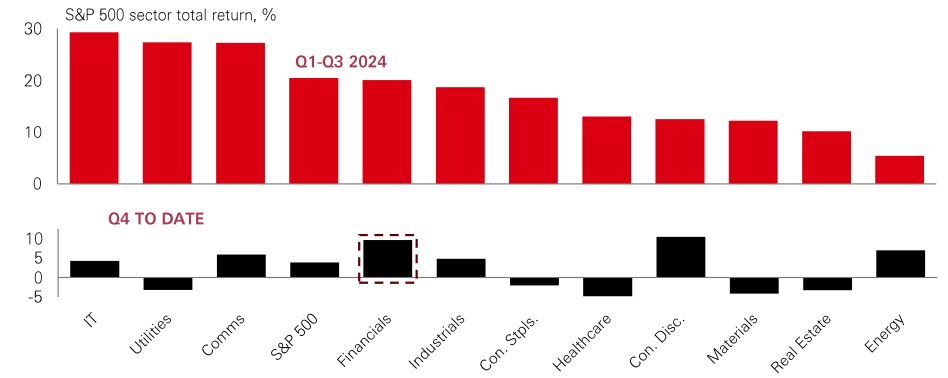
Investors remain in good spirits post-election, with US stocks steadying after previous week’s big rally. Credit spreads have ground lower to record tights. Potential policy changes – in the form of lower corporate tax rates and deregulation – have given markets a fresh catalyst. Does this extend the trend of “US exceptionalism”?
The US economic growth premium is still expected to shrink in 2025, and profit growth will be more evenly distributed across the globe. There is still a big valuation case for EAFE and EM stocks. That means that any better-than-expected news can be doubly good news for market performance.
But rising policy uncertainty weighs on the global outlook. What’s more likely, therefore, is broadening out at the sector and factor level. In the US, we’ve seen signs that the market is prepared to look beyond the technology sector, with financials and energy performing strongly this quarter on the prospect of a regulatory overhaul. And in an environment characterised by still-high inflation, a shallower cutting cycle, and economic expansion, neglected parts of global stock markets – such as value stocks – could catch up. In 2025, a multi-factor, multi-sector approach could work best.
After a year of dramatic moves in policy rate expectations, a possible shift towards inflationary fiscal policies in the US has once again raised the prospect of the Fed keeping rates higher for longer. One asset class that could be well placed to benefit from that is securitised credit.
Given its floating rate nature, securitised credit moves differently to other asset classes during economic cycles and offers an alternative source of risk-adjusted returns. That’s contributed to it being one of the best performing fixed income asset classes over the past two years – with 2024 expected to be another strong year.
For allocators, fixed income has historically been a natural portfolio diversifier to stocks, given their usually uncorrelated relationship. But the potential shift back to higher-for-longer rates – and greater correlation between the two assets – raises the risk of the traditional 60/40 stock/bond portfolio coming under threat again.
For securitised credit, low correlation to regular fixed income, and lower correlation to stocks than corporate bonds could make it an option for multi-asset portfolios. Given the high starting income levels and wide securitised credit spread (versus history) the mix of both factors could generate attractive total return going forwards for investors.
The value of investments and any income from them can go down as well as up and investors may not get back the amount originally invested. Past performance does not predict future returns. Investments in emerging markets are by their nature higher risk and potentially more volatile than those inherent in some established markets. The level of yield is not guaranteed and may rise or fall in the future. For informational purposes only and should not be construed as a recommendation to invest in the specific country, product, strategy, sector or security. Any views expressed were held at the time of preparation and are subject to change without notice. Any forecast, projection or target where provided is indicative only and not guaranteed in any way. Diversification does not ensure a profit or protect against loss.
Source: HSBC Asset Management. Macrobond, Bloomberg. Data as at 7.30am UK time 15 November 2024.
2024 has generally been a year of good news on disinflation, resilient growth, and corporate profits. Central bankers have been able to pivot policy, and the global cutting cycle has got underway. But with fiscal policy remaining active, fresh uncertainty around global trade, and geopolitical tensions creating volatility in commodity prices, market concerns about inflation are likely to linger a bit longer in 2025.
Nonetheless, consensus forecasts are for inflation rates to continue drifting lower across developed and emerging markets next year. But progress is expected to be slower in some emerging markets, and notably Latin America. Brazil, for example, was among the first to hike rates in response to post-pandemic inflation, and then led the global easing cycle. But in October, its policymakers were forced to hike rates by 0.5% to tackle resurgent inflation. Regional neighbours like Mexico and Chile have faced similar pressures. Overall, most major global economies will see inflation settle in the 2-3% range over the medium term, but regional variations should be expected. Given the idiosyncratic nature of regional economies, there could be rewards for investors prepared to do their homework.
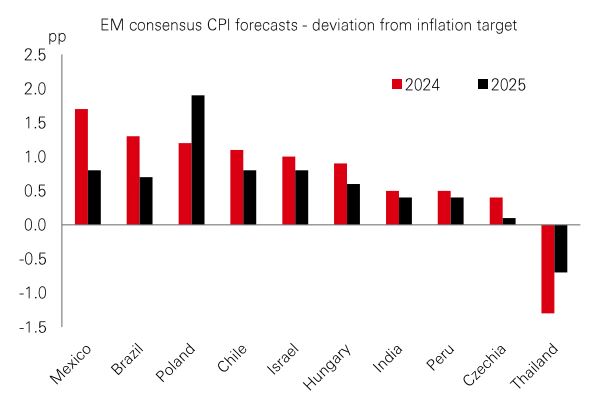
The new plan – which followed a meeting of China’s legislative body, the NPC Standing Committee – is a CNY12 trillion (USD1.7 trillion) effort to tackle longstanding local government ‘hidden’ debt, much of which involves a 3-5-year debt-swap scheme.
What investors ideally wanted was news on support for China’s property sector and consumer spending. But despite the limited direct growth boost, the debt-swap plan is still a welcome step towards repairing local government balance sheets.
Further fiscal stimulus planning is likely at December’s Central Economic Work Conference. More details on macroeconomic targets and policies will likely follow next March during the annual NPC meeting. Overall, Chinese policymakers will maintain a gradual approach for now, offering just enough to support investor confidence that “there is more to come”, while reserving some fiscal firepower for 2025 and beyond.
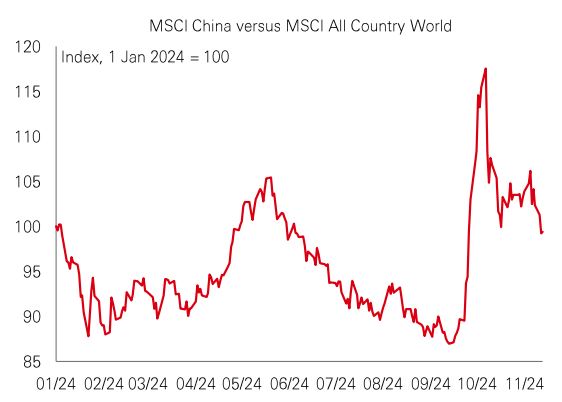
More than a decade of sluggish economic growth has contributed to a sizeable valuation discount in UK assets. Equities, for instance, trade on a modest forward price-to-earnings ratio of around 12x. The large-cap FTSE 100 index offers an average dividend yield of 4.1%, and a total shareholder yield, including buybacks, of 6%. That’s almost twice the level of the S&P 500. Even when accounting for sector differences and a large underweight to the tech sector, UK valuations look undemanding.
Research suggests that standout yield could get more appealing as interest rates fall, boding well for UK stocks. Signs of economic recovery also point to a potential opportunity for UK assets.
But there are catches. Any slowdown in global growth could hurt UK stocks. And domestic economic headwinds, the risk of more aggressive BoE policy easing, and sustained FX moves could cause volatility.
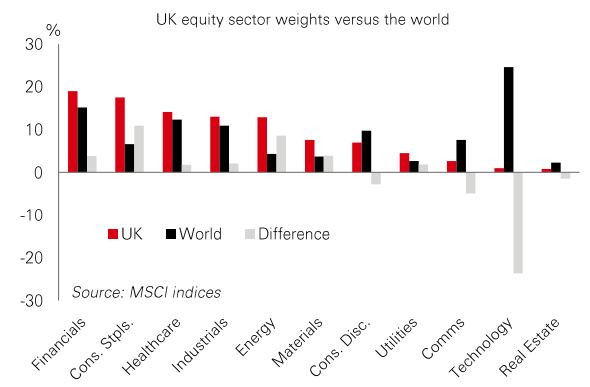
Past performance does not predict future returns. The level of yield is not guaranteed and may rise or fall in the future. For informational purposes only and should not be construed as a recommendation to invest in the specific country, product, strategy, sector or security. Any views expressed were held at the time of preparation and are subject to change without notice.
Source: HSBC Asset Management. Macrobond, Bloomberg, Datastream. Data as at 7.30am UK time 15 November 2024.
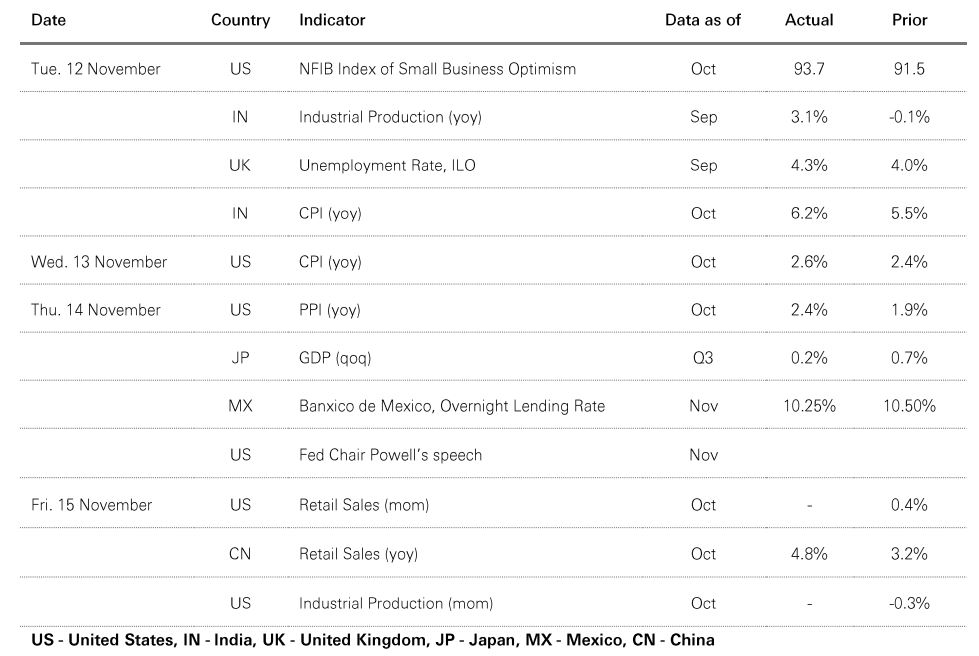
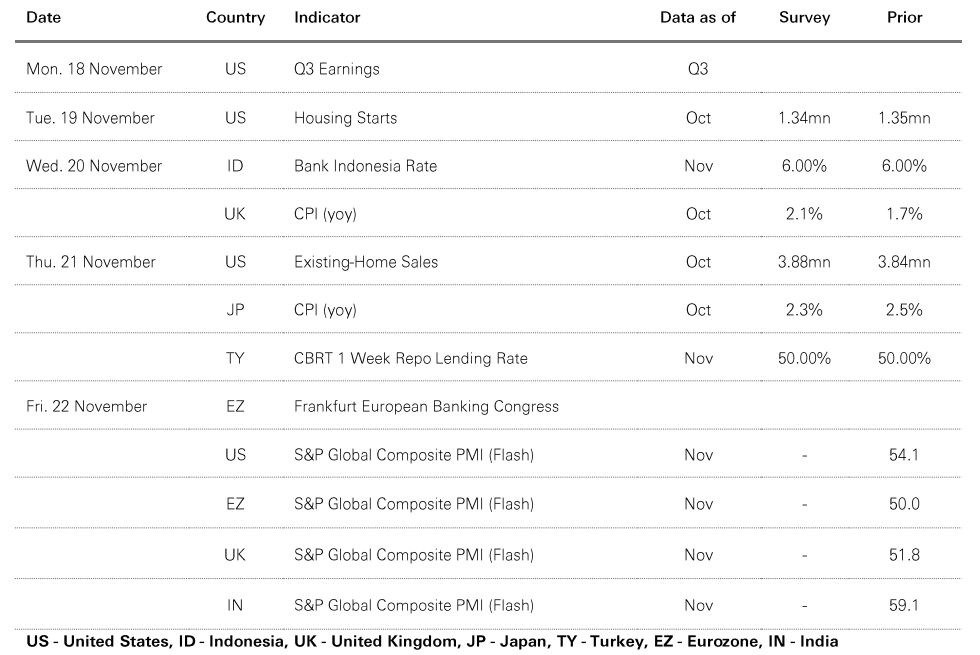
Source: HSBC Asset Management. Data as at 7.30am UK time 15 November 2024. For informational purposes only and should not be construed as a recommendation to invest in the specific country, product, strategy, sector or security. Any views expressed were held at the time of preparation and are subject to change without notice.
Risk markets were steady as investors digested the potential policy implications of the US presidential election result, with the US DXY dollar index strengthening. Core government bonds were mixed, with fiscal and inflation worries overhanging US Treasuries. US equities softened, with the rate- sensitive Russell 2000 faring worse than the S&P 500 and Nasdaq amid mixed Q3 earnings. The Euro Stoxx 50 index posted modest gains, and Japan’s Nikkei 225 weakened despite a softer yen versus the US dollar. EM equities saw widespread losses due to weakness in technology stocks, mainland China growth concerns, and ongoing geopolitical worries. The Hang Seng and South Korea’s Kospi were the main casualties. The Shanghai Composite and India’s Sensex index also weakened. In commodities, oil prices dropped amid a stronger USD and lingering oversupply concerns. Gold and copper fell.





This document or video is prepared by The Hongkong and Shanghai Banking Corporation Limited (‘HBAP’), 1 Queen’s Road Central, Hong Kong. HBAP is incorporated in Hong Kong and is part of the HSBC Group. This document or video is distributed and/or made available, HSBC Bank (China) Company Limited, HSBC Bank (Singapore) Limited, HSBC Bank Middle East Limited (UAE), HSBC UK Bank Plc, HSBC Bank Malaysia Berhad (198401015221 (127776-V))/HSBC Amanah Malaysia Berhad (20080100642 1 (807705-X)), HSBC Bank (Taiwan) Limited, HSBC Bank plc, Jersey Branch, HSBC Bank plc, Guernsey Branch, HSBC Bank plc in the Isle of Man, HSBC Continental Europe, Greece, The Hongkong and Shanghai Banking Corporation Limited, India (HSBC India), HSBC Bank (Vietnam) Limited, PT Bank HSBC Indonesia (HBID), HSBC Bank (Uruguay) S.A. (HSBC Uruguay is authorised and oversought by Banco Central del Uruguay), HBAP Sri Lanka Branch, The Hongkong and Shanghai Banking Corporation Limited – Philippine Branch, HSBC Investment and Insurance Brokerage, Philippines Inc, and HSBC FinTech Services (Shanghai) Company Limited and HSBC Mexico, S.A. Multiple Banking Institution HSBC Financial Group (collectively, the “Distributors”) to their respective clients. This document or video is for general circulation and information purposes only.
The contents of this document or video may not be reproduced or further distributed to any person or entity, whether in whole or in part, for any purpose. This document or video must not be distributed in any jurisdiction where its distribution is unlawful. All non-authorised reproduction or use of this document or video will be the responsibility of the user and may lead to legal proceedings. The material contained in this document or video is for general information purposes only and does not constitute investment research or advice or a recommendation to buy or sell investments. Some of the statements contained in this document or video may be considered forward looking statements which provide current expectations or forecasts of future events. Such forward looking statements are not guarantees of future performance or events and involve risks and uncertainties. Actual results may differ materially from those described in such forward-looking statements as a result of various factors. HBAP and the Distributors do not undertake any obligation to update the forward-looking statements contained herein, or to update the reasons why actual results could differ from those projected in the forward-looking statements. This document or video has no contractual value and is not by any means intended as a solicitation, nor a recommendation for the purchase or sale of any financial instrument in any jurisdiction in which such an offer is not lawful. The views and opinions expressed are based on the HSBC Global Investment Committee at the time of preparation and are subject to change at any time. These views may not necessarily indicate HSBC Asset Management‘s current portfolios’ composition. Individual portfolios managed by HSBC Asset Management primarily reflect individual clients’ objectives, risk preferences, time horizon, and market liquidity.
The value of investments and the income from them can go down as well as up and investors may not get back the amount originally invested. Past performance contained in this document or video is not a reliable indicator of future performance whilst any forecasts, projections and simulations contained herein should not be relied upon as an indication of future results. Where overseas investments are held the rate of currency exchange may cause the value of such investments to go down as well as up. Investments in emerging markets are by their nature higher risk and potentially more volatile than those inherent in some established markets. Economies in emerging markets generally are heavily dependent upon international trade and, accordingly, have been and may continue to be affected adversely by trade barriers, exchange controls, managed adjustments in relative currency values and other protectionist measures imposed or negotiated by the countries with which they trade. These economies also have been and may continue to be affected adversely by economic conditions in the countries in which they trade. Investments are subject to market risks, read all investment related documents carefully.
This document or video provides a high-level overview of the recent economic environment and has been prepared for information purposes only. The views presented are those of HBAP and are based on HBAP’s global views and may not necessarily align with the Distributors’ local views. It has not been prepared in accordance with legal requirements designed to promote the independence of investment research and is not subject to any prohibition on dealing ahead of its dissemination. It is not intended to provide and should not be relied on for accounting, legal or tax advice. Before you make any investment decision, you may wish to consult an independent financial adviser. In the event that you choose not to seek advice from a financial adviser, you should carefully consider whether the investment product is suitable for you. You are advised to obtain appropriate professional advice where necessary.
The accuracy and/or completeness of any third-party information obtained from sources which we believe to be reliable might have not been independently verified, hence Customer must seek from several sources prior to making investment decision.
The following statement is only applicable to HSBC Mexico, S.A. Multiple Banking Institution HSBC Financial Group with regard to how the publication is distributed to its customers: This publication is distributed by Wealth Insights of HSBC México, and its objective is for informational purposes only and should not be interpreted as an offer or invitation to buy or sell any security related to financial instruments, investments or other financial product. This communication is not intended to contain an exhaustive description of the considerations that may be important in making a decision to make any change and/or modification to any product, and what is contained or reflected in this report does not constitute, and is not intended to constitute, nor should it be construed as advice, investment advice or a recommendation, offer or solicitation to buy or sell any service, product, security, merchandise, currency or any other asset.
Receiving parties should not consider this document as a substitute for their own judgment. The past performance of the securities or financial instruments mentioned herein is not necessarily indicative of future results. All information, as well as prices indicated, are subject to change without prior notice; Wealth Insights of HSBC Mexico is not obliged to update or keep it current or to give any notification in the event that the information presented here undergoes any update or change. The securities and investment products described herein may not be suitable for sale in all jurisdictions or may not be suitable for some categories of investors.
The information contained in this communication is derived from a variety of sources deemed reliable; however, its accuracy or completeness cannot be guaranteed. HSBC México will not be responsible for any loss or damage of any kind that may arise from transmission errors, inaccuracies, omissions, changes in market factors or conditions, or any other circumstance beyond the control of HSBC. Different HSBC legal entities may carry out distribution of Wealth Insights internationally in accordance with local regulatory requirements.
Important Information about the Hongkong and Shanghai Banking Corporation Limited, India (“HSBC India”)
HSBC India is a branch of The Hongkong and Shanghai Banking Corporation Limited. HSBC India is a distributor of mutual funds and referrer of investment products from third party entities registered and regulated in India. HSBC India does not distribute investment products to those persons who are either the citizens or residents of United States of America (USA), Canada, Australia or New Zealand or any other jurisdiction where such distribution would be contrary to law or regulation.
The following statement is only applicable to HSBC Bank (Taiwan) Limited with regard to how the publication is distributed to its customers: HSBC Bank (Taiwan) Limited (“the Bank”) shall fulfill the fiduciary duty act as a reasonable person once in exercising offering/conducting ordinary care in offering trust services/ business. However, the Bank disclaims any guarantee on the management or operation performance of the trust business.
The following statement is only applicable to PT Bank HSBC Indonesia (“HBID”): PT Bank HSBC Indonesia (“HBID”) is licensed and supervised by Indonesia Financial Services Authority (“OJK”). Customer must understand that historical performance does not guarantee future performance. Investment product that are offered in HBID is third party products, HBID is a selling agent for third party product such as Mutual Fund and Bonds. HBID and HSBC Group (HSBC Holdings Plc and its subsidiaries and associates company or any of its branches) does not guarantee the underlying investment, principal or return on customer investment. Investment in Mutual Funds and Bonds is not covered by the deposit insurance program of the Indonesian Deposit Insurance Corporation (LPS).
Important information on ESG and sustainable investing
Today we finance a number of industries that significantly contribute to greenhouse gas emissions. We have a strategy to help our customers to reduce their emissions and to reduce our own. For more information visit www.hsbc.com/sustainability.
In broad terms “ESG and sustainable investing” products include investment approaches or instruments which consider environmental, social, governance and/or other sustainability factors to varying degrees. Certain instruments we classify as sustainable may be in the process of changing to deliver sustainability outcomes. There is no guarantee that ESG and Sustainable investing products will produce returns similar to those which don’t consider these factors. ESG and Sustainable investing products may diverge from traditional market benchmarks. In addition, there is no standard definition of, or measurement criteria for, ESG and Sustainable investing or the impact of ESG and Sustainable investing products. ESG and Sustainable investing and related impact measurement criteria are (a) highly subjective and (b) may vary significantly across and within sectors.
HSBC may rely on measurement criteria devised and reported by third party providers or issuers. HSBC does not always conduct its own specific due diligence in relation to measurement criteria. There is no guarantee: (a) that the nature of the ESG / sustainability impact or measurement criteria of an investment will be aligned with any particular investor’s sustainability goals; or (b) that the stated level or target level of ESG / sustainability impact will be achieved. ESG and Sustainable investing is an evolving area and new regulations are being developed which will affect how investments can be categorised or labelled. An investment which is considered to fulfil sustainable criteria today may not meet those criteria at some point in the future.
THE CONTENTS OF THIS DOCUMENT OR VIDEO HAVE NOT BEEN REVIEWED BY ANY REGULATORY AUTHORITY IN HONG KONG OR ANY OTHER JURISDICTION. YOU ARE ADVISED TO EXERCISE CAUTION IN RELATION TO THE INVESTMENT AND THIS DOCUMENT OR VIDEO. IF YOU ARE IN DOUBT ABOUT ANY OF THE CONTENTS OF THIS DOCUMENT OR VIDEO, YOU SHOULD OBTAIN INDEPENDENT PROFESSIONAL ADVICE.
© Copyright 2024. The Hongkong and Shanghai Banking Corporation Limited, ALL RIGHTS RESERVED.
No part of this document or video may be reproduced, stored in a retrieval system, or transmitted, on any form or by any means, electronic, mechanical, photocopying, recording or otherwise, without the prior written permission of The Hongkong and Shanghai Banking Corporation Limited.